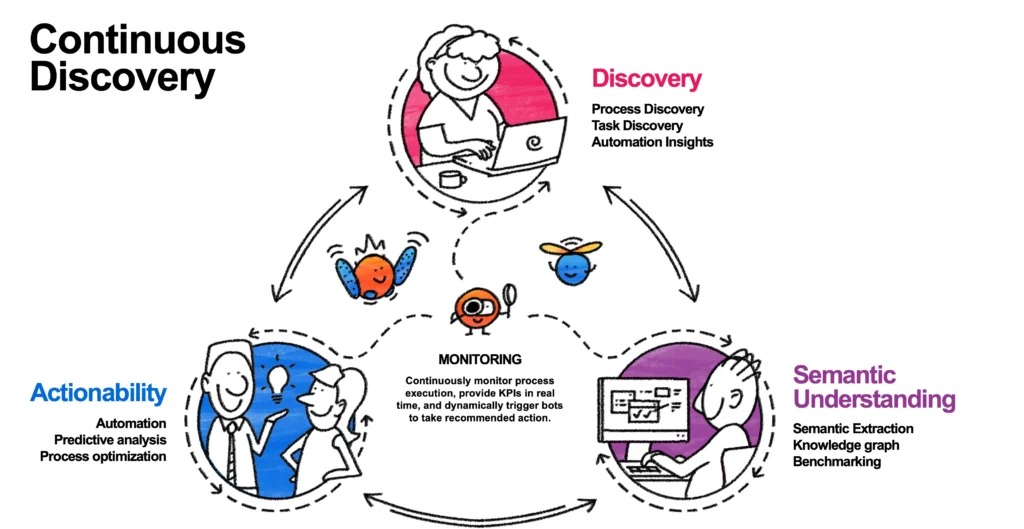UiPath Process Mining - Best RPA Process Mining Tool
UiPath Process Mining represents an advanced RPA Process Mining Tool created to convert data from your business application’s backend and provide interactive dashboards for the process. It allows organizations to analyze all the processes within the system and find business solutions for long-running processes.
It is a sequence of activities that can either add or decrease value. In the UiPath Process Mining vision, business value takes center stage in every process. It is tangible, offering benefits such as increased turnover, improved customer satisfaction, compliance with laws, and fostering employee contentment.
RPA Process Mining Tools
Application Systems log is massive amounts of information data, which was used by Process Mining tools, to Analyzed Application models and provide the process graph to the business user.
RPA Process Mining Tool Interactive visualization accelerates insight generation, allowing in-depth investigation of actual processes. Each tool makes distinct choices in filtering and visualizing data, impacting result quality.
The interactive visualization of processes greatly speeds up insight generation time. It lets you investigate what the process really was. Every process mining tool makes different choices when filtering and visualizing the used data. This can have a great impact on the quality of the results.

UiPath Process Mining is a tool that helps you quickly understand and enhance your processes. Traditionally for tech experts, UiPath makes it user-friendly for all in business. This ensures everyone gains continuous insights, reacts promptly to changes, and achieves process improvements.

Process Mining Cycle
1. Data Transformation: Visualize your data by extracting and creating real-time multidimensional process models. Transform and clean up the data to align with the application’s expected input. Enhance analysis possibilities by adding business logic and enriching the data.
2. Data Analysis: Utilize AppOne for initial analysis and configure the app for business rollout. Integrate business procedures and rules to establish a detailed reference for every business transaction across teams.
3. Continuous Monitoring: Deploy the app to business users for ongoing process monitoring. Identify key business risks and uncover opportunities for optimization and transformation. This continuous monitoring enables proactive measures to enhance efficiency and drive positive changes in the business processes.
What are the Types of Process Mining?
There are Four main types of Process Mining
- Discovery (or Automated Process Discovery):
Purpose: To create process models without prior knowledge of the actual processes.
How It Works: Analyzes event logs to automatically generate process models, providing an initial understanding of the workflow. - Conformance (or Conformance Checking):
Purpose: To compare observed processes with predefined models and identify deviations.
How It Works: Compares actual event data with expected process models, highlighting areas of non-compliance or deviations. - Enhancement (or Extended Process Mining):
Purpose: To improve existing process models by adding additional information or details.
How It Works: Utilizes event data to enhance and refine process models, providing a more accurate representation of the real-world processes. - Extension
Purpose: To extend process mining beyond the analysis of existing processes by incorporating additional data sources or perspectives.
How It Works: Integrates external data sources, such as financial or customer data, to provide a broader context for process analysis. This type aims to enrich the understanding of processes by incorporating diverse datasets.
Each type of Process Mining serves a specific purpose in understanding, analyzing, and improving business processes based on the data generated by systems and applications.
Top 5 Process Mining Company & Tools

UiPath Process Mining Connectors
Organizations employ ERP, CRM, BPM, multiple databases, and other tools for day-to-day operations, generating substantial data logs. Business Information Systems play a pivotal role in collecting and managing this vast amount of information.
Process mining tools assist organizations in assimilating and interpreting this extensive data, offering insights for process optimization.
AppOne serves as a tool that furnishes detailed dashboards for processes, requiring event logs from the application. Sometimes, these logs are available in different formats, necessitating conversion to the specified event format.
We have a basic connector that extracts and transforms data into AppOne logs. In UiPath, we offer three types of connectors in the UIPath interface:
UiPath Process Mining Benifit
Process mining offers several benefits when integrated with Robotic Process Automation (RPA). Here are some key advantages:
Process Discovery and Understanding:
- Benefit: Process mining allows organizations to automatically discover, visualize, and understand their existing processes.
- Rationale: This understanding is crucial before implementing RPA, as it helps identify areas of improvement and automation opportunities.
Process Verification and Validation:
- Benefit: Process mining helps validate whether the designed processes align with the actual execution in the organization.
- Rationale: This ensures that RPA implementations are based on accurate and up-to-date process information, reducing the risk of automating flawed or inefficient processes.
Identifying Automation Opportunities:
- Benefit: Process mining can highlight processes or tasks that are repetitive, rule-based, and suitable for automation through RPA.
- Rationale: This helps organizations prioritize their automation efforts, focusing on processes with the highest potential for efficiency gains.
Optimizing Processes for Automation:
- Benefit: Process mining identifies bottlenecks, inefficiencies, and variations in processes, enabling optimization before RPA implementation.
- Rationale: Optimizing processes beforehand ensures that RPA implementations are more effective, leading to improved performance and cost savings.
Monitoring RPA Performance:
- Benefit: Process mining provides real-time visibility into RPA processes, allowing organizations to monitor performance and identify issues.
- Rationale: Monitoring ensures that RPA bots are operating as intended, and any deviations or anomalies can be quickly addressed to maintain efficiency.
Continuous Improvement:
- Benefit: Process mining supports continuous improvement initiatives by providing insights into process performance over time.
- Rationale: This allows organizations to iteratively refine and enhance their RPA implementations, adapting to changing business requirements and ensuring sustained benefits.
Compliance and Audit Trail:
- Benefit: Process mining creates a detailed audit trail of process execution, which is valuable for compliance and regulatory purposes.
- Rationale: Having a comprehensive audit trail helps organizations demonstrate adherence to regulations and ensures transparency in RPA operations.
Reduced Implementation Risks:
- Benefit: By using process mining, organizations can mitigate risks associated with RPA implementation by basing decisions on accurate process data.
- Rationale: This reduces the likelihood of errors, rework, and unexpected challenges during RPA deployment.
Data-Driven Decision-Making:
- Benefit: Process mining enables data-driven decision-making in RPA implementations, as insights are derived from actual process data.
- Rationale: This leads to more informed decisions regarding automation strategies, resource allocation, and overall process optimization.
Demo & Videos
UiPath Process Mining Product Demo
This demo gives you an overview of UiPath Process Mining capabilities, showcasing how the integrated UiPath Platform empowers you to discover, understand, action, and monitor your complex business processes.
process monitoring and optimization
Unlock the power of automation with UiPath Process Mining. Discovering automation opportunities within your business processes has never been easier. UiPath Process Mining seamlessly reads data from your line of business systems and applications, translating it into intuitive visualizations that shed light on your process landscape.
Identifying inefficiencies and bottlenecks becomes a breeze as you gain a comprehensive understanding of your processes. With this insight, you can strategically optimize your workflow through automation, streamlining operations and boosting efficiency.
But the journey doesn’t end there. UiPath Process Mining ensures continuous improvement by empowering you to monitor your processes in real-time. Stay in control and on top of your automated workflows, making certain that your processes not only get automated but also stay on the path of optimal performance.
Make informed decisions, transform your operations, and elevate your efficiency with UiPath Process Mining. Uncover the true potential of your processes and embark on a seamless automation journey today.
Account Payable – Use Case
This demo gives you an overview of UiPath Process Mining capabilities, showcasing how the integrated UiPath automation platform empowers you to discover, automate and monitor your complex business processes.
UiPath process mining FAQ interview questions
1. What is UiPath Process Mining?
UiPath Process Mining is an advanced tool that converts data from business applications’ backend to create interactive dashboards, allowing organizations to analyze and optimize their processes.
2. How does UiPath Process Mining benefit businesses?
UiPath Process Mining offers benefits such as increased turnover, improved customer satisfaction, compliance with laws, and fostering employee contentment by providing insights for process optimization.
3. What types of activities can be visualized using UiPath Process Mining?
UiPath Process Mining can visualize various activities, including process discovery, conformance checking, enhancement of existing process models, and extension of process mining beyond existing processes.
4. What is the Process Mining Cycle in UiPath?
he Process Mining Cycle involves data transformation, data analysis, and continuous monitoring. It includes visualizing data, analyzing it for business rollout, and deploying the application for ongoing process monitoring.
5. How does UiPath Process Mining integrate with RPA?
UiPath Process Mining integrates with Robotic Process Automation (RPA) by providing benefits such as process discovery, validation, identifying automation opportunities, optimizing processes, and monitoring RPA performance.
6. What are the types of Process Mining?
There are four main types of Process Mining:
- Discovery
- Conformance Checking
- Enhancement (Extended Process Mining)
- Extension.
7. How does Process Mining contribute to automation opportunities?
Process Mining helps identify repetitive, rule-based tasks suitable for automation through RPA, enabling organizations to prioritize automation efforts for efficiency gains.
8. Why is continuous monitoring important in UiPath Process Mining?
Continuous monitoring in UiPath Process Mining allows organizations to identify key business risks, uncover opportunities for optimization, and proactively enhance efficiency, driving positive changes in business processes.
9. How does UiPath Process Mining support compliance and audit trail?
UiPath Process Mining creates a detailed audit trail of process execution, ensuring compliance with regulations and providing transparency in RPA operations.
10. What are the key benefits of using UiPath Process Mining in RPA implementations?
Benefits include reduced implementation risks, data-driven decision-making, process discovery and understanding, process verification, identifying automation opportunities, optimizing processes for automation, monitoring RPA performance, continuous improvement, and compliance.
Quiz for Process Mining
UiPath Process Mining Consultant in India
UiPath Process Mining Consultant in India
